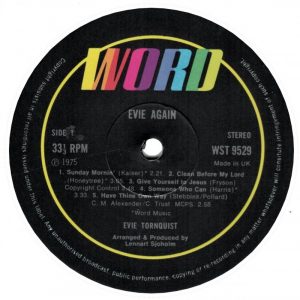The influence of legendary composer Kurt Kaiser is still felt in the Contemporary Christian Music genre he helped launch, author Terry York said during a “change-making conversation” webinar hosted by Baptist News Global.
In his new book, Kurt Kaiser: Icon and Conscience of Contemporary Christian Music, York illuminates the life of the church music legend who shaped 20th century church music through hundreds of songs including “Pass it On” and “Oh How He Loves You and Me.”
 A key figure in the rise and dominance of Waco, Texas-based WORD Music, Kaiser helped inspire the development and careers of budding Christian composers, arrangers and performers who went on to shape the emerging genre of Contemporary Christian Music, said York, a retired professor of Christian ministry at Baylor University’s George W. Truett Theological Seminary and once dually appointed to the Baylor School of Music.
A key figure in the rise and dominance of Waco, Texas-based WORD Music, Kaiser helped inspire the development and careers of budding Christian composers, arrangers and performers who went on to shape the emerging genre of Contemporary Christian Music, said York, a retired professor of Christian ministry at Baylor University’s George W. Truett Theological Seminary and once dually appointed to the Baylor School of Music.
Even after his 2018 death at age 83, Kaiser’s spirit continues to animate the category to the extent it remains musically strong, biblically grounded and within the capability of churches to effectively perform, York explained during the July 18 webinar moderated by BNG Executive Director Mark Wingfield.
“He obviously could move from genre and style and do excellent work, but he never left those principles as being guiding principles for him,” the biographer said. “When Southern Baptist and other church musicians … were trying to decide how much should we sing of the culture’s music, how much should we sound like the culture, he’s saying, ‘Do as much of it as you can do and still be connected to the Bible, to good music and to the church.’ And I think that’s what stays with us of his work, his influence.”
That influence began to develop when Kaiser and composer/producer Ralph Carmichael teamed up to create Christian youth musicals with smash successes like Tell It Like It Is in 1969 and Natural High in 1971. The Southern Baptist Sunday School Board had launched the movement with Good News in 1967. The Southern Baptist agency followed up in 1972 with Celebrate Life, which York said defines the apex of the genre.
“I think Celebrate Life was the pinnacle of this whole thing, as far as quality is concerned. But we have to go back and say that Tell It Like It Is was such a smash success, the music was excellent, the work was excellent. And it got such widespread usage that if you go back and look, you might see Tell It Like It Is as the peak, just a bit higher, than Celebrate Life.”

Terry York
Wingfield praised York for capturing the personalities and connections behind the development of Christian youth musicals and the genres and talents that would evolve from them.
“For those of us of a certain age growing up in the church, these are household names for us, but it is hard to explain today the influence that WORD Music had in that time. I think it’s fascinating to know how this all came to be in a place like Waco. For those who don’t know, Waco is not an urban center.”
The Texas city became that musical center when Baylor graduate Jarrell McCracken founded WORD Inc. in 1951 to produce “The Game of Life,” recordings of fictitious play-by-play football games between teams representing good and evil and coached by Jesus and Satan. He eventually brought in Kaiser and Carmichael in the late 1950s to produce music while the label also published work by evangelical leaders such as Billy Graham.
Once in Waco, Kaiser joined Seventh and James Baptist Church, which gave him access to the top-quality choral musicians who were students in Baylor’s School of Music, York said. The result was a synergy — but still separation — between the workings of the SBC’s Sunday School Board and WORD Music, he added.
“Kurt was playing both sides of the field. On Sunday and Wednesday, he was a Southern Baptist, but when he went to work Monday, Tuesday, Wednesday, Thursday and Friday he was in competition with the Southern Baptists.”
That overlap enabled Kaiser to reach an audience wider than the more dominant Baptist Sunday School Board could reach during that period, Wingfield observed. “He was able to bridge beyond that to bring in the larger Mainline and evangelical community.”
“Exactly right,” York responded. “The reason that’s true is because the Baptist Sunday School Board had to answer to the denomination. They had to answer theologically, and they had to put their work inside the larger strategy of the Southern Baptist Convention. WORD did not have that obligation at all. So, it was not an equal race. There was equal quality in the people who were writing, equal desire to present something fresh for the churches. It’s just the Sunday School Board had a little bit more clumsy pathway.”
 Meanwhile, Kaiser’s influence began to inspire young musicians who went on to become acclaimed performers in their own right, including Evie Tornquist of “I’m 4-foot-11 but I’m going to Heaven and that makes me feel 10-feet tall” fame, Wingfield said.
Meanwhile, Kaiser’s influence began to inspire young musicians who went on to become acclaimed performers in their own right, including Evie Tornquist of “I’m 4-foot-11 but I’m going to Heaven and that makes me feel 10-feet tall” fame, Wingfield said.
“Kurt was a remarkably gifted musician, and one of the things he could do very well was to hear a singer perform and know how to write music for them that would get the very best out of their skillset, out of their abilities,” York explained.
Kaiser also made a mark in secular pop music. “He worked with a lot of celebrities all the way from Dale Evans from ‘The Roy Rogers Show’ to Carol Lawrence and B.J. Thomas. He was operating in both worlds.”
Living in multiple musical worlds paid significant dividends for Kaiser and the label release of Tell It Like It Is, York said. The financial rewards of that hit funded expansion of Kaiser’s work and of WORD Music.
“That launched WORD Music,” York said. “They were already in business, but this now gives WORD Music the reputation and the ability to say, ‘This is what we’re doing. We’re fresh.’ And it got onto television and NBC did a presentation of Tell It Like It Is.”
 The label became so successful it eventually was sold to the American Broadcasting Co., Thomas Nelson and Gaylord Entertainment. “It was bought and sold two or three times because they were so successful that they got that kind of attention, and Kurt was right there,” York said.
The label became so successful it eventually was sold to the American Broadcasting Co., Thomas Nelson and Gaylord Entertainment. “It was bought and sold two or three times because they were so successful that they got that kind of attention, and Kurt was right there,” York said.
Kaiser’s reputation as a faithful Christian and consummate business professional contributed to the value of WORD Music as much as his musical abilities did, he added. “That’s why I came up with the subtitle for the book — Icon and Conscience of Contemporary Christian Music — because he could just step into a meeting, he could step onto a stage, he could step into a performance and everybody sat up or stood up just a little straighter. They behaved themselves a little more like a Christian and an honest business person, and he didn’t have to preach to anybody or tell anybody off.”
After reading the book, Wingfield said he could not think of a higher-profile composer, arranger or producer in the Christian genre who was also a “consummate churchman” like Kaiser.
“You have this wonderfully successful commercial enterprise that’s situated adjacent to what is then the world’s largest Baptist university, with an outstanding music school and the connection to the Southern Baptist churches as well, but there comes a point at which Kurt becomes a church planter for a truly unique Baptist church — Dayspring Church in Waco, which is still a vibrant church today,” Wingfield said.
 The congregation’s mission statement — “Sacred, Simple” — and its emphasis on contemplative Christianity reflect the faith that defined Kaiser’s life, said York, who is a member of the church. “And Kurt, of course, was in charge of the music. It was contemplative and it was organic. From the beginning the congregation understood music should come from our experience and our community. And it still does to some extent.”
The congregation’s mission statement — “Sacred, Simple” — and its emphasis on contemplative Christianity reflect the faith that defined Kaiser’s life, said York, who is a member of the church. “And Kurt, of course, was in charge of the music. It was contemplative and it was organic. From the beginning the congregation understood music should come from our experience and our community. And it still does to some extent.”
Wingfield asked York how Kaiser handled the commercialization that became prevalent in contemporary Christian music.
“At the beginning, he helped get it started. He helped envision it, and then for a while he was one of the main guides and one of the main promoters and engines for that,” York replied. But “after a while his principles are starting to rub against some of the new directions and trajectories (in the industry), and that eventually becomes an issue.”
It wasn’t that Kaiser was a snob about styles or against artists achieving financial success, but he was a stickler for maintaining musical and religious values, York said. “He had some standards. One was biblical, one was connecting up the music that he wrote to the church. He also wanted the highest standards of music, and he wanted straight-laced business and morals. Those were his pillars.”


